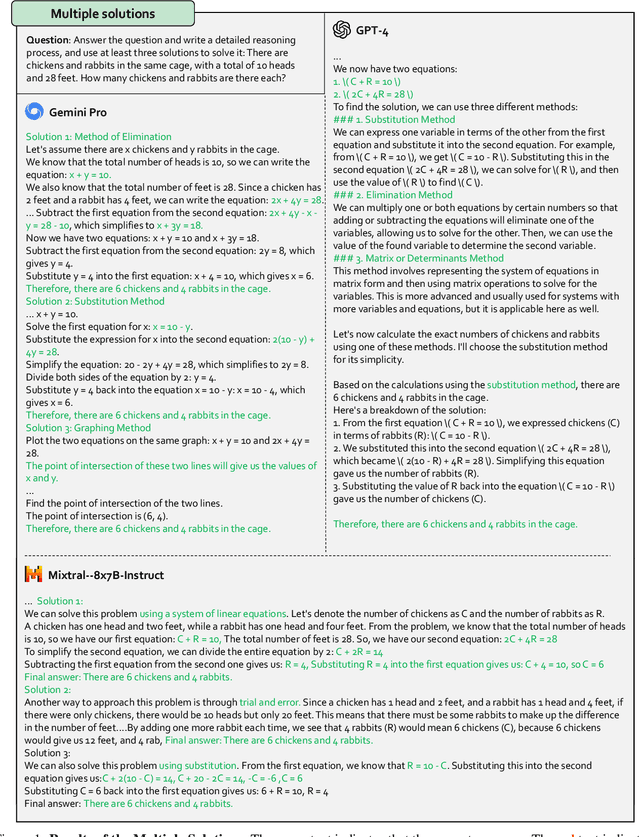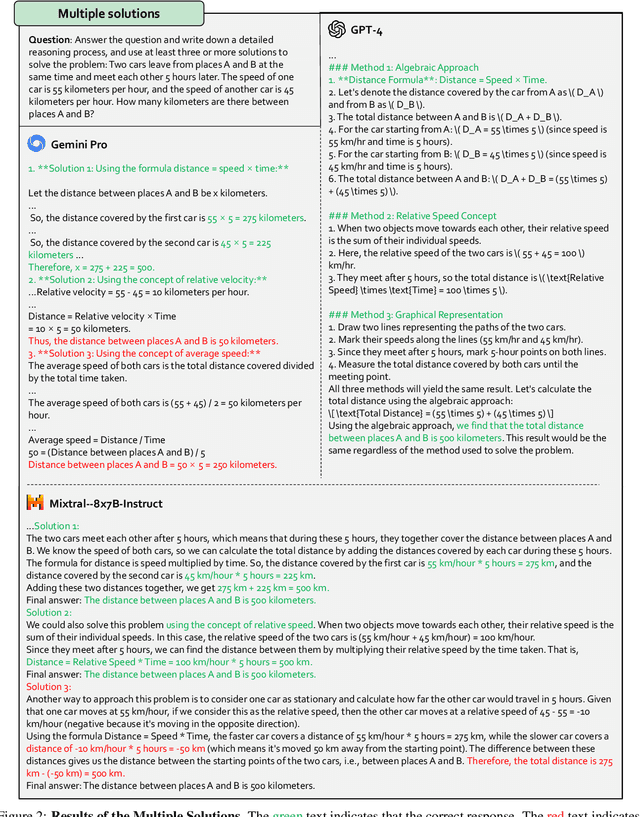Zhipin Wang
LLLMs: A Data-Driven Survey of Evolving Research on Limitations of Large Language Models
May 25, 2025Abstract:Large language model (LLM) research has grown rapidly, along with increasing concern about their limitations such as failures in reasoning, hallucinations, and limited multilingual capability. In this survey, we conduct a data-driven, semi-automated review of research on limitations of LLM (LLLMs) from 2022 to 2024 using a bottom-up approach. From a corpus of 250,000 ACL and arXiv papers, we identify 14,648 relevant papers using keyword filtering, LLM-based classification, validated against expert labels, and topic clustering (via two approaches, HDBSCAN+BERTopic and LlooM). We find that LLM-related research increases over fivefold in ACL and fourfold in arXiv. Since 2022, LLLMs research grows even faster, reaching over 30% of LLM papers by late 2024. Reasoning remains the most studied limitation, followed by generalization, hallucination, bias, and security. The distribution of topics in the ACL dataset stays relatively stable over time, while arXiv shifts toward safety and controllability (with topics like security risks, alignment, hallucinations, knowledge editing), and multimodality between 2022 and 2024. We release a dataset of annotated abstracts and a validated methodology, and offer a quantitative view of trends in LLM limitations research.
DeepSeek vs. o3-mini: How Well can Reasoning LLMs Evaluate MT and Summarization?
Apr 10, 2025Abstract:Reasoning-enabled large language models (LLMs) have recently demonstrated impressive performance in complex logical and mathematical tasks, yet their effectiveness in evaluating natural language generation remains unexplored. This study systematically compares reasoning-based LLMs (DeepSeek-R1 and OpenAI o3) with their non-reasoning counterparts across machine translation (MT) and text summarization (TS) evaluation tasks. We evaluate eight models across three architectural categories, including state-of-the-art reasoning models, their distilled variants (ranging from 8B to 70B parameters), and equivalent conventional, non-reasoning LLMs. Our experiments on WMT23 and SummEval benchmarks reveal that the benefits of reasoning capabilities are highly model and task-dependent: while OpenAI o3-mini models show consistent performance improvements with increased reasoning intensity, DeepSeek-R1 underperforms compared to its non-reasoning variant, with exception to certain aspects of TS evaluation. Correlation analysis demonstrates that increased reasoning token usage positively correlates with evaluation quality in o3-mini models. Furthermore, our results show that distillation of reasoning capabilities maintains reasonable performance in medium-sized models (32B) but degrades substantially in smaller variants (8B). This work provides the first comprehensive assessment of reasoning LLMs for NLG evaluation and offers insights into their practical use.
Assessment of Multimodal Large Language Models in Alignment with Human Values
Mar 26, 2024



Abstract:Large Language Models (LLMs) aim to serve as versatile assistants aligned with human values, as defined by the principles of being helpful, honest, and harmless (hhh). However, in terms of Multimodal Large Language Models (MLLMs), despite their commendable performance in perception and reasoning tasks, their alignment with human values remains largely unexplored, given the complexity of defining hhh dimensions in the visual world and the difficulty in collecting relevant data that accurately mirrors real-world situations. To address this gap, we introduce Ch3Ef, a Compreh3ensive Evaluation dataset and strategy for assessing alignment with human expectations. Ch3Ef dataset contains 1002 human-annotated data samples, covering 12 domains and 46 tasks based on the hhh principle. We also present a unified evaluation strategy supporting assessment across various scenarios and different perspectives. Based on the evaluation results, we summarize over 10 key findings that deepen the understanding of MLLM capabilities, limitations, and the dynamic relationships between evaluation levels, guiding future advancements in the field.
From GPT-4 to Gemini and Beyond: Assessing the Landscape of MLLMs on Generalizability, Trustworthiness and Causality through Four Modalities
Jan 29, 2024



Abstract:Multi-modal Large Language Models (MLLMs) have shown impressive abilities in generating reasonable responses with respect to multi-modal contents. However, there is still a wide gap between the performance of recent MLLM-based applications and the expectation of the broad public, even though the most powerful OpenAI's GPT-4 and Google's Gemini have been deployed. This paper strives to enhance understanding of the gap through the lens of a qualitative study on the generalizability, trustworthiness, and causal reasoning capabilities of recent proprietary and open-source MLLMs across four modalities: ie, text, code, image, and video, ultimately aiming to improve the transparency of MLLMs. We believe these properties are several representative factors that define the reliability of MLLMs, in supporting various downstream applications. To be specific, we evaluate the closed-source GPT-4 and Gemini and 6 open-source LLMs and MLLMs. Overall we evaluate 230 manually designed cases, where the qualitative results are then summarized into 12 scores (ie, 4 modalities times 3 properties). In total, we uncover 14 empirical findings that are useful to understand the capabilities and limitations of both proprietary and open-source MLLMs, towards more reliable downstream multi-modal applications.
ChEF: A Comprehensive Evaluation Framework for Standardized Assessment of Multimodal Large Language Models
Nov 05, 2023Abstract:Multimodal Large Language Models (MLLMs) have shown impressive abilities in interacting with visual content with myriad potential downstream tasks. However, even though a list of benchmarks has been proposed, the capabilities and limitations of MLLMs are still not comprehensively understood, due to a lack of a standardized and holistic evaluation framework. To this end, we present the first Comprehensive Evaluation Framework (ChEF) that can holistically profile each MLLM and fairly compare different MLLMs. First, we structure ChEF as four modular components, i.e., Scenario as scalable multimodal datasets, Instruction as flexible instruction retrieving formulae, Inferencer as reliable question answering strategies, and Metric as indicative task-specific score functions. Based on them, ChEF facilitates versatile evaluations in a standardized framework, and new evaluations can be built by designing new Recipes (systematic selection of these four components). Notably, current MLLM benchmarks can be readily summarized as recipes of ChEF. Second, we introduce 6 new recipes to quantify competent MLLMs' desired capabilities (or called desiderata, i.e., calibration, in-context learning, instruction following, language performance, hallucination, and robustness) as reliable agents that can perform real-world multimodal interactions. Third, we conduct a large-scale evaluation of 9 prominent MLLMs on 9 scenarios and 6 desiderata. Our evaluation summarized over 20 valuable observations concerning the generalizability of MLLMs across various scenarios and the composite capability of MLLMs required for multimodal interactions. We will publicly release all the detailed implementations for further analysis, as well as an easy-to-use modular toolkit for the integration of new recipes and models, so that ChEF can be a growing evaluation framework for the MLLM community.
 Add to Chrome
Add to Chrome Add to Firefox
Add to Firefox Add to Edge
Add to Edge